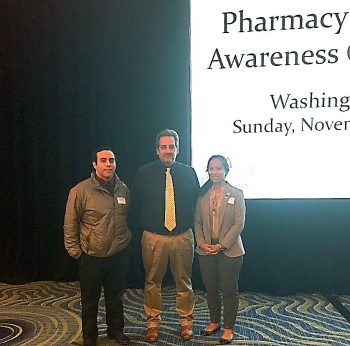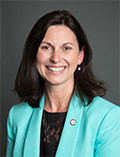Special report: Responding to the drug diversion crisis through collaboration and empowerment
Thanks to Kalyann Kauv for providing the following report on a Pharmacy Diversion Awareness Conference sponsored by the U.S. Drug Enforcement Administration in November. The DEA began offering these conferences five years ago to educate pharmacists, pharmacy technicians and pharmacy loss personnel nationwide on the identification and prevention of diversion activity.
Drug diversion: a medical and legal concept involving the transfer of any legally prescribed controlled substance from the individual for whom it was prescribed to another person for any illicit use. The term comes from the “diverting” of the drugs from their original medical purpose.

Drug diversion contributes to abuse, overdose and death – and drug overdose deaths tripled between 1999 and 2014.
Bringing it closer to home, Virginia State Health Commissioner Marissa Levine recently declared Virginia’s opioid abuse crisis a Public Health Emergency to bring more awareness to the issue. Levine also released a “Virginia Statewide Standing Order for Naloxone,” authorizing pharmacists to dispense the anti-overdose drug following the Virginia Board of Pharmacy-approved protocol.
In an ongoing effort to enhance the collaboration between public health and law enforcement, the DEA’s Pharmacy Diversion Awareness Conferences focus on the growing issue of diversion of pharmaceutical controlled substances. Discussion includes the ways pharmacists can assist in identifying and preventing diversion.
Hundreds of pharmacists from institutional and community settings, hailing from the Greater D.C., Maryland, and Virginia areas, attended the Nov. 19-20 PDAC sessions in Arlington, Va.
Special Agent in Charge Karl Colder of the DEA’s Washington Division Office and Unit Chief Thomas Prevoznik of the Liaison & Policy Section, Office of Diversion Control, began the meeting by citing solemn statistics concerning the increasing misuse nationwide of opioid prescription medications and illegal synthetic substances. Colder referred to the epidemic as an “equal opportunity destroyer.”
The presentation included a 45-minute documentary, “Chasing the Dragon: The Life of an Opiate Addict,” which followed recovering addicts and the family members who were affected by their substance abuse addictions, including how addiction permanently altered their lives. This documentary was produced by the FBI and DEA.
A common misconception is that opioid abuse is something that takes place illegally on the streets away from our homes. In fact, most opioid addiction begins in a provider’s office and as a prescription. Patients commonly store leftover medications from previous health conditions as a precaution in case they will need them again in future. This increases the opportunity for family members or friends to divert medications and for expired medications to become potentially dangerous.
Initiatives such as the DEA’s National Prescription Drug Take-Back Day, now in its 11th year, have encouraged the public to drop off unused or expired medication for safe disposal at collection sites around the country. This year’s Take Back Day collected 447 tons of unused medications.
“Wherever the art of the medicine is loved, there is also a love of humanity.” – Hippocrates
The more health care professionals respect medicine, the more they will treat their patients with respect, recognizing the vast difference prescriptions can make. In the efforts toward promoting public health safety, pharmacists are now, more than ever, in a unique position to serve as vital partners with the DEA in providing information about drug diversion. Pharmacists are the last line in ensuring the proper indication and dosage of prescriptions.
Because of this, the DEA continues to request that pharmacists get involved, stay involved and ensure that their colleagues are doing the same. They can contact the DEA to report suspicious activity and to find more resources and education on the Drug Diversion Task Force.
Bill Winsley, a retired pharmacist and former Ohio Board of Pharmacy member and past-president of the National Association of Boards of Pharmacy, reinforced the significant contributions a pharmacist can make toward the opioid epidemic. He provided multiple narratives as a practicing community pharmacist. In one case, he assisted the DEA in uncovering a provider misusing opioid prescribing in Ohio, noting the extensive harm the provider caused the public in the interest of financial gain.
The pharmacist’s ability to understand and discern the difference between appropriate and inappropriate prescribing of opioids, anti-anxiety and muscle relaxant medications is an important skill, highlighting the necessity of being attentive and alert to red flags.
Winsley’s No. 1 rule as a pharmacist is this: Always act in the best interest of the patient. Sometimes that means saying “No.”

Caroline Juran, a 1995 alumna of the VCU School of Pharmacy, has served on the Virginia Board of Pharmacy for 11 years, the past six years as executive director. She provided updates, including highlights from the efforts made by Virginia Governor’s Task Force on Prescription Drug and Heroin Abuse, reviewing pharmacy-related bills passed by the 2015 General Assembly and noting new continuous quality improvement requirements.
Juran urged pharmacists stay informed and engaged in the past, current and future regulations that are voted into legislation. She recommended pharmacists stay equipped with knowledge on what Virginia is doing to face the opioid epidemic, including subscribing to online newsletters, following the Virginia Board of Pharmacy and Virginia Department of Health websites and viewing the video “Prescription Drug Abuse: Red Flags for Pharmacists and Pharmacy Technicians.”
As a future pharmacist, this conference provided me an invaluable opportunity to hear from the perspective of the DEA’s office, pharmacists and the Board of Pharmacy. Through collaboration and communication, our expertise can be combined to tackle opioid abuse. Focusing on the epidemic as a whole can be seen as an immense task to overcome, but through collaboration, awareness and daily due diligence, each person can make a difference and protect people from harm. Before this conference, it was unclear to me how I could make an impact or the significant role the pharmacy profession can have. Now I feel better informed and clearer as to how to stay connected with our partners in these efforts.
Kalyann Kauv is a fourth-year Pharm.D. student at VCU School of Pharmacy. She is national public relations liaison for the Student National Pharmaceutical Association, former president of the VCU chapter of SNPhA and a member of Phi Lambda Sigma and Phi Delta Chi. She can be reached at [email protected].
EDITOR’S NOTE: The Alcohol Awareness Council offers an additional resource for those challenged by drug overdose issues: http://www.recovery.org/topics/drug-overdose/
Categories Alumni news, Events, Student news, Student organizations